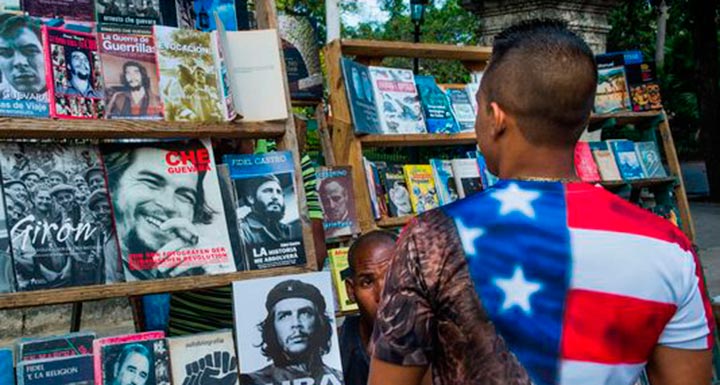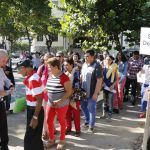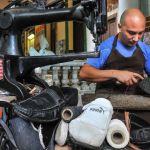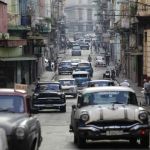
Havana talks will start thaw of U.S.-Cuba relations
Open travel between the U.S. and Havana. Using American credit cards to pay for hotel stays in Cuba. Foreign diplomats able to travel beyond their host cities. Internet connections and freedom of speech.
A host of issues — untouched by officials in either the U.S. or Cuba for decades — will suddenly be on the table this week during rare high-level chats in Havana between the two former foes.
When U.S. Assistant Secretary of State Roberta Jacobson, the top U.S. diplomat for Latin America, sits down to talks with her Cuban counterpart in Havana, it will mark the first time a senior U.S. official has done so in at least three decades. Twice-yearly meetings on migration between U.S. and Cuban officials are typically attended by lesser-ranked State Department officials.
This week’s meetings — scheduled for Wednesday and Thursday — are also the first since President Obama’s sweeping announcement last month that the United States will renew ties with the Cuban government, including opening an embassy in Havana and easing restrictions on trade and travel to the island.
On Thursday, the White House revealed the specifics of the new rules, which significantly loosen the five-decade Cuban embargo and make it easier for Americans to travel to the socialist island — changes that undoubtedly will come up for discussion this week.
“It’s very significant,” Phil Peters, a former State Department official and president of the non-profit Cuba Research Center, said of the talks. “The United States delegation is going to talk to the Cubans about normalizing relations. There’ll be a lot to talk about.”
Some issues likely to come up:
• Opening the embassy. Since the two countries broke off diplomatic ties in 1961, the seven-story waterfront building has housed the U.S. Interests Section in Havana. American flags will again be hoisted outside when the building regains its embassy status. Both countries are likely to rescind a law that bars diplomats in each country from venturing more than 25 miles from their host cities.
• Aviation agreement. The new rules allow American travelers to book travel to Cuba directly with a U.S. carrier, rather than through pre-approved charter companies. To realize this, the U.S. and Cuba will need to hash out a civil aviation agreement to create rules for taxes, fees, customs and security, Peters said.
• Migration. Perhaps the most controversial issue that could arise between the two delegations is discussion of the Cuban Adjustment Act, enacted in 1966, which allows Cubans a quick path to residency once they reach U.S. soil. Cuban officials have blasted the law, saying it encourages its citizens to make the treacherous journey across the Florida Straits, and Obama may want to rescind it to avoid a humanitarian crisis, said Robert Muse, a Washington-based lawyer specializing in U.S.-Cuba laws. Coast Guard officials have already seen an uptick of Cubans setting out on makeshift rafts since Obama’s Dec. 17 announcement. “A major rafter incident could undermine all this progress,” Muse said.
• Tourism/trade. From cellphones to tractor parts, the new rules make it easier for U.S. products to reach the island. They also enable “micro-investing” from American sources to Cuban entrepreneurs. The question remains: How much is the Cuban government willing — or able — to take in? Empowering its citizens too quickly with extra cash or access to technology could threaten the government in Havana that has historically relied on tight control over the populace, said Carl Meacham, director of the Americas Program at the Center for Strategic and International Studies. Also, with Cuban hotels already at max capacity in the high season, it’s unclear how many more American travelers they can take on. “This has been happening at warp speed,” Meacham said. “On the American side, you certainly see the willingness to move forward. The question is if the Cubans are able to meet us in kind.”
In Cuba, despite receiving little airtime on state-run newscasts, news of the upcoming meetings is spreading among the populace, said Jose Jasán Nieves Cárdenas, an independent journalist living in Havana. Cubans are nervous about possible changes to the Cuban Adjustment Act but are mostly excited about the meetings and potential for improvements to their daily lives, he said.
“It’s returned hope to the people,” Cárdenas said. “They don’t understand all the details of the political process but they feel it’ll bring something positive.”
Reopening of the U.S. Embassy in Havana will close an oft-controversial chapter in U.S.-Cuba relations.
Even though these are touted as cordial, mostly logistical meetings — the first deicing of five decades of frosty relations — the issue of Cuba’s human rights will undoubtedly surface, said Ted Piccone of the Brookings Institution. The Cuban government jailed 8,410 political prisoners through November in 2014, making it one of the worst years in recent memory, according to the Cuban Commission for Human Rights and National Reconciliation, a group on the island that monitors government repression.
Cuban officials released 53 political prisoners as part of the original agreement with the U.S., though two of them were later rearrested. Jacobson and her delegation will likely press for more acquittals. “The release of political prisoners recently is just the beginning of the game,” Piccone said.
Sitting across from Jacobson will likely be Josefina Vidal, a high-ranking career Cuban diplomat and head of the Foreign Ministry’s North American affairs division, said Frank Mora, a former Defense Department official and Director of the Latin American and Caribbean Center at Florida International University.
It will be Jacobson’s job to set the agenda for the renewed relationship between the two countries.
“This is going to set the tone for future meetings,” said Ted Henken, a Baruch College Latino Studies professor and longtime Cuba scholar and author.
(From: USA Today)







